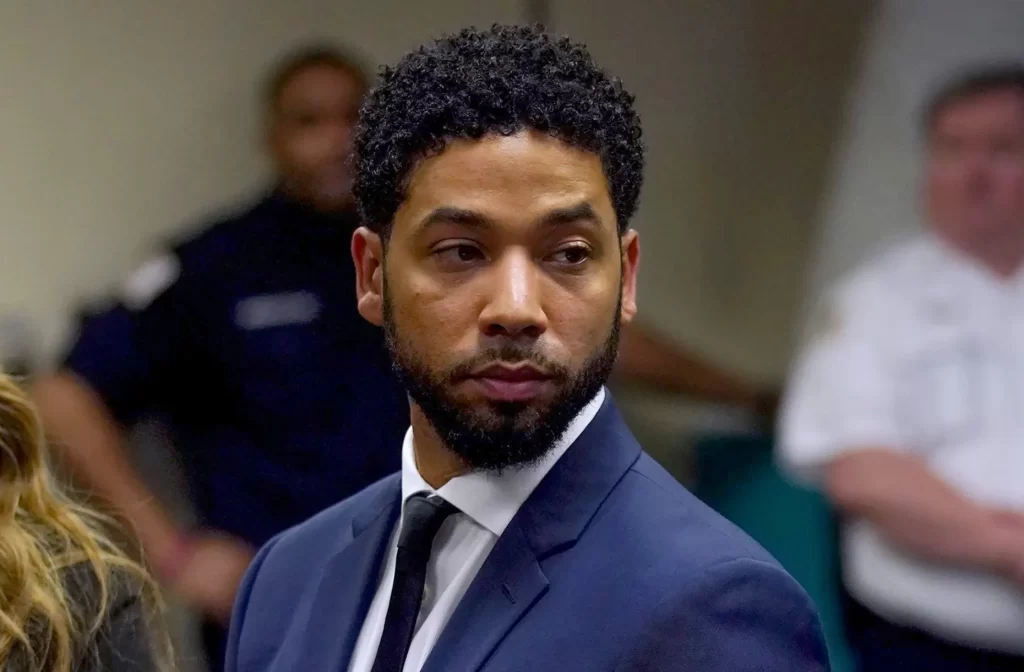Jussie Smollett’s 2019 conviction for staging a racist and homophobic attack against himself was overturned on Thursday by the Illinois Supreme Court, citing issues with the prosecutor’s involvement. The decision focused on procedural concerns rather than Smollett’s innocence, ruling that a special prosecutor should not have been allowed to intervene after the Cook County State’s Attorney, Kim Foxx, dropped charges against Smollett. The agreement included Smollett forfeiting his $10,000 bond and completing community service, and at the time, many critics argued that the case was unfairly resolved.
In January 2019, Smollett, a Black and gay actor known for his role on the TV show Empire, reported being attacked by two men in downtown Chicago. He claimed the attackers hurled racial and homophobic slurs at him, beat him, and placed a noose around his neck. The incident sparked a significant investigation by the Chicago Police Department and drew national attention. However, prosecutors later alleged that Smollett had staged the attack himself. The motivation behind the hoax, they suggested, was Smollett’s frustration with the Empire studio’s response to hate mail he had received.
After an initial investigation, Cook County State’s Attorney Kim Foxx’s office dropped all 16 felony charges against Smollett, which was met with public outrage. Critics, including then-Mayor Rahm Emanuel, argued that the decision was a miscarriage of justice, calling it a “whitewash.” Subsequently, a special prosecutor, Dan Webb, was appointed to oversee the case, leading to a grand jury indictment and a new trial. In 2021, Smollett was convicted on five counts of disorderly conduct, specifically for filing false police reports.
The Illinois Supreme Court’s decision on Thursday focused on the legal procedures rather than the merits of Smollett’s case. Justice Elizabeth Rochford wrote that, while the case had garnered significant public interest and many felt the initial resolution was unjust, it would be even more unjust to allow the state to disregard agreements made under the law. The court found that the decision by Foxx to drop the charges, along with the resulting agreement, should have been honored, thereby invalidating the appointment of the special prosecutor.
Smollett’s defense attorney, Nenye Uche, celebrated the ruling, stating that “rule of law was the big winner today.” He expressed gratitude for the court’s decision, which he claimed restored order to Illinois’ criminal law system. Uche also described the case as a “vindictive persecution,” arguing that the prosecution was not based on facts but on a desire to exact revenge on Smollett.
Despite the Illinois Supreme Court’s ruling, special prosecutor Dan Webb disagreed with the outcome. Webb emphasized that the court’s decision did not reflect on Smollett’s innocence and that the trial’s evidence was overwhelming. He pointed to the testimony at trial, which revealed that Smollett had paid two men he knew from Empire to stage the attack. The men were instructed to shout racist and homophobic slurs and to claim that the attack occurred in “MAGA country,” an apparent reference to Donald Trump’s presidential slogan.
While the conviction was overturned, Webb noted that Chicago officials could still pursue a civil case against Smollett to recover the $130,000 they spent investigating the fake attack. This amount covered overtime pay for police officers working on the case.
The case has had lasting impacts on Smollett’s career and public image. The actor, who initially gained fame as a child star in The Mighty Ducks and later became known for his role on Empire, has faced significant fallout from the 2019 incident. Despite the controversy, he starred in the 2023 film The Lost Holliday alongside Vivica A. Fox.
In the wake of the ruling, some legal experts have raised questions about the potential implications for future cases in Illinois. The decision to void the intervention of a special prosecutor may affect future criminal proceedings, particularly when an elected official, like Foxx, is involved in dropping charges. However, the case seems far from over, as Smollett’s civil legal battles and efforts to recover the money spent on the investigation remain unresolved.
The decision also highlighted the polarizing nature of the case, with politicians and public figures divided over Smollett’s actions and the handling of the case. Illinois Supreme Court Justices Mary Jane Theis and Joy Cunningham recused themselves from the decision, while the court ruled in favor of Smollett, effectively overturning his previous conviction.
The drama surrounding Jussie Smollett’s conviction and its subsequent overturning is far from over, and it is clear that the public interest in the case, as well as the legal challenges he faces, will continue to make headlines.







